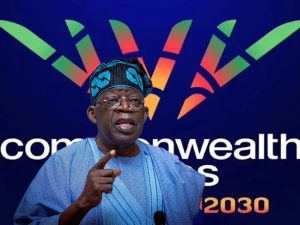Tinubu Reaffirms Nigeria’s Preparedness to Host Africa’s First-Ever Commonwealth Games in 203

A VIEW: President Bola Ahmed Tinubu has reaffirmed Nigeria’s commitment to hosting the 2030 Commonwealth Games, marking what would be the first time the multi-sport event is staged on African soil. Speaking with conviction, Tinubu emphasized Nigeria’s readiness to deliver an inclusive and diverse world-class tournament that not only elevates African sports but also reflects the continent’s growing role in global economic and cultural frameworks; and this will issue-into Africa economic frameworks and investment opportunities.

It’s well-meaning to note that the prospect of hosting the Games carries significant economic implications for Nigeria and the wider-range of West African region. Over the years, large-scale sporting events have historically driven infrastructural development, boosted tourism, stimulated local business ecosystems, to mention but a few.
In Nigeria, the Commonwealth Games could catalyze long-term investments in the transport networks, energy supply, housing projects, hotel services, digital infrastructure, grocery markets, construction, health sector, security, technology and many more. Yet these prospective ripple effects would depend on deliberately-effective planning to a pre-conclusion towards the event takeoff period. The sporting events could also create hundreds of thousands of jobs. But, from experience, one could say that ‘caution’ is already clearly waving a watchout-alarm that poor fiscal management, corruption, or cost overruns, which are mostly common negating features in mega-event projects globally, could erode expected benefits that might deepen Nigeria’s public debt if not highly considered to be well managed.
In consideration of the regional and political dimensions, Nigeria’s bid could be taken as an economical developmental pursuit, more than an athletic endeavor; as it represents a strategic political gesture within Africa and the Commonwealth community. Hosting the Games would position Nigeria as a continental leader in sports diplomacy, strengthening its soft-power-capacity to convene regional actors. Politically, the Games provide Abuja with a platform to project stability and global relevance amid ongoing debates about governance, security and democratic resilience in West Africa. Regional blocs such as ECOWAS are likely to view Nigeria’s hosting as a chance to showcase collective strength, while Commonwealth nations may see it as a rebalancing of representation away from traditional hosts in Europe, Asia and the Oceania.
From the business and market implications, commercial perspective of the Games are expected to attract foreign direct investment, partnerships with multinational corporations, or even new opportunities for local entrepreneurs. Also, the Nigerian private sector, particularly in telecommunications, banking, real estate, etc. is anticipated to play a critical role in financing and service delivery.
Presumably, global brands could leverage the Games to deepen penetration in African consumer markets, while local businesses could gain exposure to international audiences. Yet, the questions about Nigeria’s regulatory environment, currency volatility, purchasing power and security landscape, would beam as factors that investors will weigh carefully, even with view to social and cultural dimensions.
Beyond economics and politics, the Games could reshape Nigeria’s cultural and social landscape. Sports often act as unifying forces in diverse societies, and the Games may serve to bridge Nigeria’s ethnoreligious regional divides. For families and communities, it will represent both pride and pressure; pride in global recognition and pressure from potential disruptions in rising living costs, or displacement linked to urban redevelopment. Culturally, hosting the Games would provide a platform to showcase to an international audience the Nigeria’s rich heritage, from music, arts and film to fashion and cuisine. Equally, this cultural diplomacy could further strengthen Nigeria’s creative economy, which is already one of Africa’s fastest-growing industries.

While the rhetoric around mega-events is often celebratory, scholars stress the need to recognize human and social costs. Large-scale construction projects sometimes displace vulnerable communities, leading an inflation on housing prices that could place strain on public services. In the stance of ordinary Nigerians, the challenge should be ensuring that the Games’ benefits such as jobs, infrastructural developments, sociocultural elation, etc., are not overshadowed by inflation, debt burdens, or exclusion.
On the planning journey, the civil society’s expectations would be to have transparency in budgeting, inclusive participation in planning, sense of accountability in expenditure and safeguards to protect citizens from economic displacement, in order to ensure that the Games leave behind a positive legacy rather than a temporary spectacle sponsored by lose and careless governance.
At the bust/stop of a successful sporting events, Nigeria’s hosting of the 2030 Commonwealth Games would set a precedent for other African nations, signaling that the continent can deliver on complex global-scale projects. It may also prompt a rethinking of how global institutions engage with Africa, not merely as a site of resource extraction, but as a hub for innovation, cultural-interaction and world-class events.
Commonwealth itself, to award the Games to Nigeria, would mean reinforcing efforts to diversify host nations and expand inclusivity beyond traditional geographies. This move will align with broader discussions about decolonization, equity and the future relevance of the Commonwealth in a multipolar world.
President Tinubu’s reaffirmation of Nigeria’s commitment to host an inclusive, diverse and world-class 2030 Commonwealth Games on African soil, is declaration that reflects more than national ambition; it encapsulates Africa’s desire for visibility, inclusion, and as an agency in global sports-economics. Although, the coming years will determine whether Nigeria can translate promise into practice, balancing economic opportunity with social responsibility, and cultural pride with political accountability.
As the preparation roadmap unfolds, the 2030 Commonwealth Games may become a defining test not only of Nigeria’s capacity but of Africa’s place in shaping the next chapter of international cooperation.








